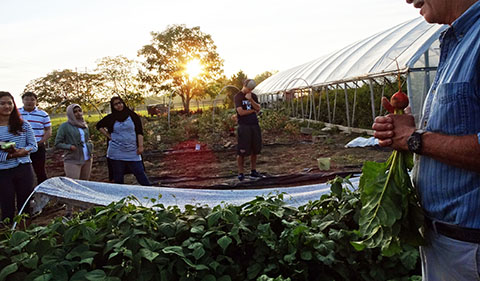
Dr. Art Trese shares his dream of increasing the amount of local agriculture in the community with ELIP 1300 students
By Dawn Bikowski
What do students in the ELIP 1300 Business Relations and Communication Skills have to offer the local food movement or the Ohio University Food Studies theme?
Can business students help identify new markets for produce grown at a magical place on campus with a bamboo forest and rows and rows of beautiful organic produce?
Undergraduate Austin J. Hopkins, from Marietta, Ohio, wondered the same thing.
“At first I thought, this class is about business communication—why am I thinking about food? Then I realized how food is connected to everything, and the economics of food and food systems that I’d never thought about before. Now whenever I’m buying groceries, I’m thinking about where they’re coming from, quality, local vs. large-scale farms, all kinds of things I hadn’t really considered before,” Hopkins says.

ELIP 1300 is partnering with the Food Studies theme and the Plant Biology Learning Gardens, located on West State Street, on the “business of food.” By the end of the course, teams will present their recommendations for ways to increase the amount of garden produce sold on campus or in local markets or venues.
“I love this project because I get to work for a real group of people who have a real need,” says sophomore Hams Masoud Bakhit Kashoob. “And I get to use surveys and tools to get real data to use for making our recommendations. Doing this project with a group of Americans and people from other countries makes it even more interesting.”

Teammates Risa Shibayama, Austin Hopkins, Sydney Kovach, and Adam Razak check out the student garden area of OHIO’s Plant Biology Learning Gardens
The Food Studies theme, directed by Dr. Theresa Moran, has become increasingly popular in recent years. As an interdisciplinary study closely related to culture and society, it’s the perfect theme for this project-based course that not helps students hone their intercultural communication skills.
Hyunjung “Chloe” Jeon, majoring in Global Studies and from South Korea, likes the interaction in class. “I am getting to work with people from all over the U.S. and other countries, and I am learning more about this area of Ohio, too. This class is a great way to meet people and talk about the social and cultural experiences behind food.”
Magical Place with Rows and Rows of Beautiful Organic Produce
The Plant Biology Learning Gardens, with Dr. Art Trese as the lead, is a magical place with a bamboo forest, a deck for barbecues, and rows and rows of beautiful organic produce. The student garden area is one of Trese’s favorite spots, where new gardeners can experience the joy of watching their hard work come to life. Working with Moran, he hopes to raise awareness of all this location has to offer, not just for the food he grows, but for the mindsets he encourages.

Dr. Trese and Hams Masoud Bakhit Kashoob discuss the benefits of students learning to grow their own food as a part of their university education
ELIP 1300 instructor and small-business owner and Ohio University alum Art Oestrike agrees.
“Athens, Ohio, helps to sustain a number of local businesses and enterprises. Students of Ohio University should be able to experience and aid in this practice throughout their years in Athens. By seeing and participating within the local food scene in and around campus, students will hopefully see the importance of buying local and participating in local economies after their days in Athens are complete. We hope that, through this project, students will become more involved and interested in the local food scene in Athens and beyond, in addition to building their intercultural and business communication skills,” he says.
The class is 2 credit hours and offered every fall and spring.



















Comments